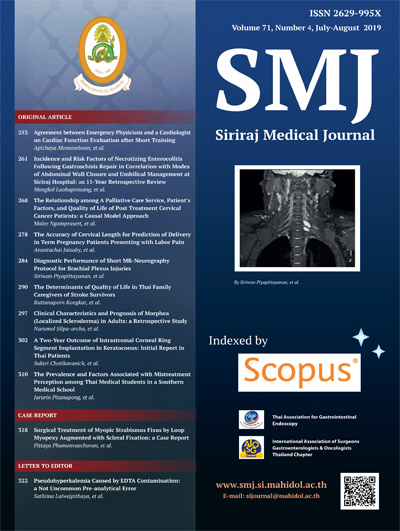The Relationship among a Palliative Care Service, Patient’s Factors, and Quality of Life of Post Treatment Cervical Cancer Patients: a Causal Model Approach
Keywords:
Quality of life; post-treatment cervical cancer; palliative care delivery service; sexual health; selfmanagement; social supportAbstract
Objective: To test a causal pathway of palliative care (PC) service delivery system on quality of life (QOL) of patients with post-treatment stage II-III cervical cancer (PT2-3CC-PTs).
Methods: The cross-sectional design with two-staged sampling was implemented to recruit 447 PT2-3CC-PTs and 16 healthcare providers from 12 cancer center hospitals. Standardized tools and procedures were used, followed by the structural equation model (SEM) analysis to measure variables of interest.
Results: The average age was 54.07 (SD 11.72) years, most of the patients (90.2%) received radiotherapy and chemotherapy, and more than two-thirds (68.7%) had comorbidities. The results showed that the patients had problems with the physical, role, emotional, and social functioning due to urinary and vaginal symptoms which
made them anxious about sexual health. SEM analysis also revealed that the PC service delivery system did not improve the patients’ QOL significantly. Finally, it was found that healthcare providers had low competencies in PC, and their caring did not respond to the patients’ needs concerning a woman’s specific role and responsibility.
Conclusion: The PC service delivery system in Thailand mainly provides physical care without encouraging family to collaborate in care of the patients. PC training to increase competency of providers to care for PT2-3CC-PTs should take the patients’ age, severity of comorbidities, treatment differences, and a woman’s role, especially sexual health into account. Thus, to enhance QOL (general and sexual health) in PT2-3CC-PTs, healthcare providers should focus on patients’ self-management and provider support.
Downloads
Published
How to Cite
Issue
Section
License
Authors who publish with this journal agree to the following conditions:
Copyright Transfer
In submitting a manuscript, the authors acknowledge that the work will become the copyrighted property of Siriraj Medical Journal upon publication.
License
Articles are licensed under a Creative Commons Attribution-NonCommercial-NoDerivatives 4.0 International License (CC BY-NC-ND 4.0). This license allows for the sharing of the work for non-commercial purposes with proper attribution to the authors and the journal. However, it does not permit modifications or the creation of derivative works.
Sharing and Access
Authors are encouraged to share their article on their personal or institutional websites and through other non-commercial platforms. Doing so can increase readership and citations.











